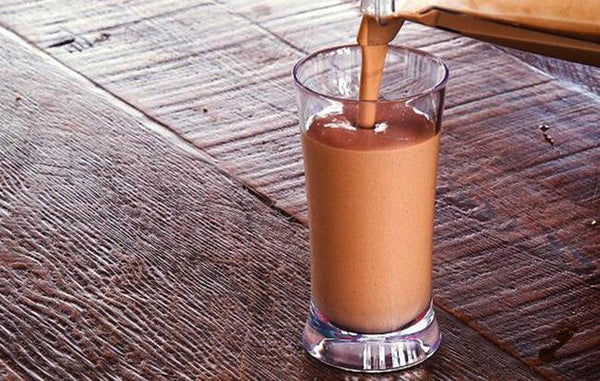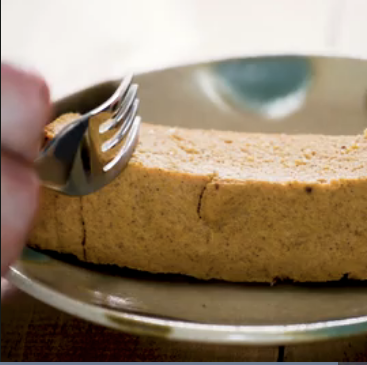NorCal Organic Blog
Our Favorite 4 Whey Protein Shakes We Can't Stop Drinking
October 04 2017
This Healthy 27-Year-Old Died After Using a Common Bodybuilding Supplement
October 03 2017
What's the Deal With BCAA Supplements?
August 25 2017
Do they really work? Yes. Do you need to take them after you workout? Maybe.
Here's How You Should Eat to Maximize Your Muscle Gains
August 17 2017
The Easiest Banana Bread You've Ever Made
August 10 2017
The Amount Of Protein That Will Max Out Your Gains
July 25 2017
The Salad All Beer Lovers Should Try
July 18 2017
How is Source Organic Whey Protein Made?
January 02 2015
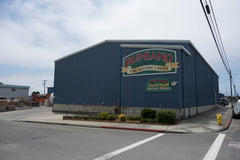 What makes Source Organic Whey stand out to compared to other organic whey proteins? The name says it all. How we SOURCE our whey is the most important part. Unlike other organic whey proteins we tell our customer exactly where our whey comes from. We work directly with the family owned and operated Rumiano Cheese Company and the local dairies in and surrounding Crescent City California. The pastures, soil, and weather in and around Crescent City make for arguably the best dairy farming conditions in the United States. With well over 300 days/year of green pastures, these cows are truly pasture fed.
What makes Source Organic Whey stand out to compared to other organic whey proteins? The name says it all. How we SOURCE our whey is the most important part. Unlike other organic whey proteins we tell our customer exactly where our whey comes from. We work directly with the family owned and operated Rumiano Cheese Company and the local dairies in and surrounding Crescent City California. The pastures, soil, and weather in and around Crescent City make for arguably the best dairy farming conditions in the United States. With well over 300 days/year of green pastures, these cows are truly pasture fed.Milk from the family dairies arrives at the Rumiano Cheese factory and is heated in large vats to meet FDA pasteurization requirements. There is NO raw organic whey due to FDA limitations and feasibility of production.
The liquid whey is passed through a series of filters which filter the solid whey particles form the liquid. When nearly all the water is removed the whey is sprayed into a drying container which fills directly into large bags. The large bags become smaller bags of Source Organic Classic Whey.
For Source Organic, the whey is blended with less than 1% organic sunflower lecithin which coats each particle of whey to allow the whey to dissolve more easily in water.
From farm to you we have the shortest distance of farm fresh milk to whey.
Many thanks to the cows, farmers, and the Rumiano family.
Thanks for reading!
Raw Whey and Raw Dairy? Can I or Should I Buy Raw Whey Protein?
December 22 2014
We are often asked if Source Organic Whey Protein is raw? What is truly raw whey protein? First let’s define "raw."
It is generally accepted that raw food that is not heated above 117 degrees (48 degrees Celsius). The term raw is often used in the natural and organic food industry but there is NO industry certification for raw, each company that claims their product is raw does so on their own accord. Many companies use what I would consider deceptive wording to infer their products are raw. For example, Raw Organic Whey, would lead me to believe that their whey protein is raw and organic. Raw Organic Whey is NOT raw, although they do not make this clear on their website. Where does Raw Organic Whey come from? There is no information on sourcing and we know from this post that USDA organic does not mean that the whey is necessarily from the US or that the cows are pasture fed.
So what if you want raw organic whey? There are no companies producing raw organic whey protein. Unfortunately there is no process currently available that would allow for large scale, safe, repeatable production of raw organic whey protein. Selling raw organic whey online would be ILLEGAL per FDA regulations. Agree with this or not, it is the law.
The only way to get raw whey would be to start with raw milk and separate the curds and whey, this would result in a raw liquid whey, which then could theoretically be dried into a powder (below 117 degrees). Remember, to produce 1 lb of whey protein you need 100 lbs of liquidwhey. For a DIY delicious and fun raw cheese and raw whey recipe try this.
So how is Source Organic Whey made? Check out our next post!
Thanks for reading!
What Does USDA Organic Mean? What is Organic Whey?
December 17 2014
Today there are many organic whey proteins available. When Source Organic Whey Protein started in 2011 there were less than 5 brands in the US and I knew where and how each one was produced. Currently there are many brands of organic whey protein, and few if any brands are transparent in where they source their organic whey protein. So how does a consumer know where their whey is coming from?
The USDA Organic standard defines the following in regards to organic agriculture: "standards cover the product from farm to table, including soil and water quality, pest control, livestock practices, and rules for food additives."
The USDA Organic Seal on a whey protein DOES NOT tell you:
- Where your whey protein comes from. Many organic whey protein companies now buy from huge dairy conglomerates overseas and don't know anything about how the cows are fed or raised.
- What the dairy cows eats on a daily basis. The USDA clearly defines what the cows can't eat to meet organic standards, but what they do eat varies greatly. Very few organic-dairy cows get to graze on nice green pastures 300+ days/year like our dairy cows. To raise and care for cows the right way, big companies wouldn't be able to get the margins they need. And since they are all about margins, only the minimum organic standards are met in the most cases.
- How the farmers take care of their animals. The American Humane Association goes beyond the USDA guidelines and sets a higher standard for animal care and wellbeing. Source Organic is the only whey protein certified by the American Humane Association.
In conclusion, ask some questions! Look at the organic whey protein brands and see if you can trace exactly, all the way to THE FARM where your organic whey comes from. At Source Organic you can! We know our farmers and are proud to work with them!
Thank you for reading!
Source Organic Peanut Butter Protein Cookies
December 15 2014
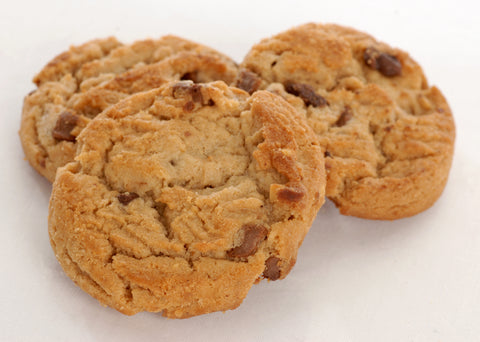 Take a look at this great recipe below that uses Source Organic's new Peanut Butter Protein. Source Organic isn't just about the best organic whey protein anymore!
Take a look at this great recipe below that uses Source Organic's new Peanut Butter Protein. Source Organic isn't just about the best organic whey protein anymore!
As always, feel free to send in you favorite recipes to possibly get featured on our blog!
COOKIES:
2 cups zucchini, shredded and thoroughly patted dry
1 cup 0% greek yogurt
4 scoops Source Organic Peanut Butter Protein
1 cup coconut sugar
1/2 cup oat flour
2 heaping tbsp. peanut butter
1 egg
1 tsp. vanilla extract
1 tsp. baking soda
Small pinch of salt
Chocolate chips to taste
Source Organic Whey - Protein Pumpkin Bread
November 28 2014
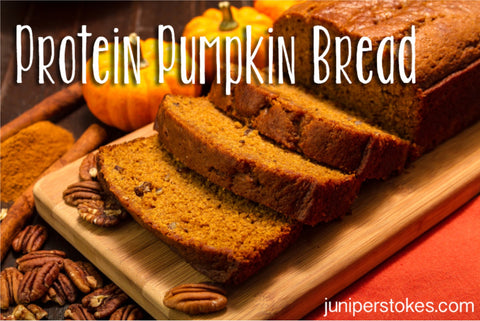 One of Source Organic's fans, Juniper Stokes, sent in an amazing recipe using Source Organic's organic whey protein. Take a look at the great recipe below, and feel free to send us recipes that you think we'd like to share!
One of Source Organic's fans, Juniper Stokes, sent in an amazing recipe using Source Organic's organic whey protein. Take a look at the great recipe below, and feel free to send us recipes that you think we'd like to share!
Ingredients
Makes 1 loaf, 8 servings
1 cup gluten-free flour mix
1/4 teaspoon salt
1/4 teaspoon baking powder
1/2 teaspoon baking soda
1 1/2 tsp pumpkin pie spice blend
1/2 cup sugar
3/4 sticks butter, softened
1 egg
a little more than 1/2 15-ounce can 100% pure pumpkin
4 scoops Source Organic Whey (42 grams of protein)
Instructions
Preheat oven to 325 degrees. Lightly grease 1 8 ½” x 4 ½” loaf pan. Combine flour, salt, baking powder, baking soda, whey, and spices in a bowl; use a whisk to mix well and set aside.
In a large bowl, beat butter and sugar until just blended. Add egg, beating well. Continue beating until very light and fluffy, a few minutes. Beat in pumpkin. Beat in flour mixture until combined.
Turn batter into prepared pan and bake for about 65 – 75 minutes, or until cake tester inserted in center comes out clean. Let loaves cool for about 10 minutes.
Nutritional Information
Per Serving:
- Fat: 10 grams
- Carbs: 13.5 grams
- Protein: 8 grams
- Fiber: 2 grams
- Sugar: 16 grams
http://www.juniperstokes.com/food-and-recipes/protein-pumpkin-bread/
Source Organic Vanilla Peanut Butter Almond Smoothie
November 19 2014
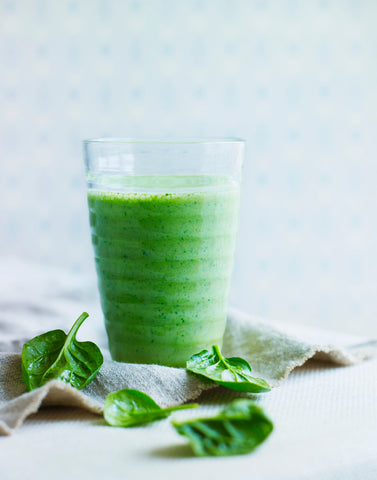 We have a great new recipe that incorporates Source Organic's new Peanut Butter Protein. This smoothie is a great way to get a boost in the morning with a ton of essential vitamins and nutrients. If you're looking for a little extra protein boost, it never hurts to add a scoop of Source Organic Whey to your blender.
We have a great new recipe that incorporates Source Organic's new Peanut Butter Protein. This smoothie is a great way to get a boost in the morning with a ton of essential vitamins and nutrients. If you're looking for a little extra protein boost, it never hurts to add a scoop of Source Organic Whey to your blender.
Ingredients:
1/2 cup spinach
2 frozen bananas
1 apple, cored
1/2 cup vanilla almond milk
2 scoops Source Organic Peanut Butter Protein
(Optional) 1 scoop Source Organic Whey
Combine, Blend, and Enjoy!
Take a look at some of our other recipes here:
Pear and Banana Protein Smoothie
Banana and Apple Cinnamon Breakfast Protein Smoothie
CLAs and a Berry Vanilla Protein Smoothie Recipe
Spiced Raspberry-Pear Organic Protein Smoothie
Banana Peanut Butter Smoothie
Source Organic Whey on Breakfast Television Toronto!
November 14 2014
We're super excited that Harley Pasternak brought a bag of Source Organic Whey with him to Breakfast Television Toronto today! Take a look at the clip below for a couple great recipes and Harley's new blender that will be coming to stores in the US very soon.
Source Organic Whey is happy to be a great way to start the day!
September Smoothie of the Month - Pear and Banana Protein Smoothie
September 29 2014
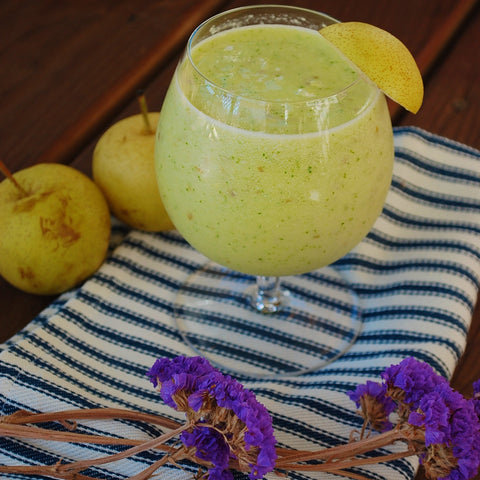 Here's a great way to start the day with delicious seasonal fruit, organic whey protein, and spinach. By adding Source Organic Whey you get over 20 grams of grass-fed protein and know that there is no better whey on the market.
Here's a great way to start the day with delicious seasonal fruit, organic whey protein, and spinach. By adding Source Organic Whey you get over 20 grams of grass-fed protein and know that there is no better whey on the market.
Ingredients:
- 1 asian pear
- 1 frozen banana (sliced)
- 1 cup almond milk
- 1 scoop Source Organic Whey
- 1/2 tsp cinnamon
- 1/2 tsp fresh ginger (grated)
- 1/2 cup spinach (optional)
Combine all the ingredients in a blender and blend for 30 seconds.
Take a look at some of our other recipes here:
Banana and Apple Cinnamon Breakfast Protein Smoothie
CLAs and a Berry Vanilla Protein Smoothie Recipe
Spiced Raspberry-Pear Organic Protein Smoothie
Banana Peanut Butter Smoothie
New Breakfast Smoothie From Harley Pasternak
September 21 2014
 Take a look below for a great way to start the day with over 30 grams of protein. Using just one scoop of Source
Take a look below for a great way to start the day with over 30 grams of protein. Using just one scoop of Source
Organic Whey, your breakfast can be quick, easy, and delicious.
INGREDIENTS
1 scoop Source Organic Whey
5 raw almonds
1 red apple
1 banana
3/4 cup nonfat Greek yogurt
1/2 cup nonfat milk
1/4 teaspoon cinnamon
DIRECTIONS
Place all ingredients in a blender. (Depending on how powerful your blender is, you may need to chop the apple and almonds into small pieces before blending.)
Blend on medium-high for 30 seconds (or until desired consistency).
Take a look at some of our other recipes here:
CLAs and a Berry Vanilla Protein Smoothie Recipe
Spiced Raspberry-Pear Organic Protein Smoothie
Banana Peanut Butter Smoothie
Harley Pasternak: What You Should Know About Whey
August 14 2014
 Source Organic Whey's global brand ambassador, Harley Pasternak, just put out a great article about the benefits of whey protein. In it he included an amazing kiwi-strawberry smoothie recipe as well.
Source Organic Whey's global brand ambassador, Harley Pasternak, just put out a great article about the benefits of whey protein. In it he included an amazing kiwi-strawberry smoothie recipe as well.
Take a look:
Harley Pasternak is a celebrity trainer and nutrition expert who has worked with stars from Halle Berry and Lady Gaga to Robert Pattinson and Robert Downey Jr. He’s also a New York Times best-selling author, with titles including The Body Reset Diet and The 5-Factor Diet. Tweet him @harleypasternak.
Do you recall the nursery rhyme that began, “Little Miss Muffet sat on a tuffet, eating her curds and whey”? You may have never wondered what whey was, or even a tuffet, for that matter (it’s basically a footstool). But whey, the byproduct of making cheese or yogurt and a superb source of protein, has hit the big time. Here’s whey, er, why:
Liquid assets. Whey is slightly more absorbent than eggs, often referred to as the perfect protein and considerably more ‘perfect’ than soy, bean or rice protein powder. Separated from the curds formed in the cheese-making process, whey starts as a thin translucent liquid, often used in protein drinks and bars. Making whey is a time-consuming process and the result spoils quickly.
Take a powder. Whey protein powder is easy to use in shakes or smoothies. Or add it to fruit, cottage cheese or homemade baked goods for a protein punch. In addition to protein, whey is also full of vitamins C, B and E, as well as calcium, copper, iron and other minerals.
Whey to go. Whey protein can enhance athletic performance and help build muscle as a result of its high amino acid content (the building blocks of protein). It’s also credited with reducing high cholesterol and assisting in weight loss. As you know, I believe in building meals around protein and fiber-rich carbohydrates. When you don’t have time to grill a chicken breast, poach salmon or even scramble eggs, whey steps up to the plate as a suitable protein provider.
When shopping for whey powder, consider these factors:
- Whey protein isolate or whey protein concentrate? The former removes most of the lactose (milk sugar) and fat, meaning most lactose-intolerant individuals can handle it. Whey protein concentrate, however, is simply dehydrated whey, and contains more fat and lactose than protein.
- Organic or conventional? Whey products made from organic milk contain no growth hormones or antibiotic residue.
- GMO-free or not? Whey from the milk of grass-fed cows contains no GMO residues, unlike animals raised on GMO grains.
- Sweetened or not? Instead of protein powders sweetened with sugar or substitutes, I prefer unsweetened whey. The fruit you’ll add to smoothies or shakes supplies natural sweetness without empty calories.
- Flavored or plain? Rather than buying vanilla, chocolate, strawberry or whatever powder, go with the basic powder and add your own natural flavors.
- Heat processed or cold processed? When protein is heated — a process called denaturing — it can make the amino acids less bioavailable. Whey dried without heat leaves the protein intact.
There are many brands out there, so stick to one that is labeled 100% Whey and doesn’t sport any unrecognizable ingredients on its label. My personal favorite is Source Organic Whey, which is unflavored, unsweetened and contains no coloring agents. You can find it on Amazon and at many Whole Foods and all Sprouts Farmers Markets.
Try this related recipe adapted from one in my book The Body Reset Diet: Power Your Metabolism, Blast Fat and Shed Pounds in Just 15 Days. It’s a great whey (sorry — I had to) to start the day!
Kiwi-Strawberry Smoothie
Serves 1
2 cups baby arugula (or spinach or watercress)
2 kiwifruit, peeled and chopped
5 fresh or frozen strawberries, chopped
1 frozen banana, chopped
2 tablespoons whey protein powder
½ cup nonfat milk or plain unsweetened almond or soy milk
Ice cubes
1. Combine all the ingredients except the milk and ice in a blender or food processor. Pulse until combined.
2. Add milk or milk substitute and blend.
3. Add ice cubes and pulse until desired consistency.
http://greatideas.people.com/2014/08/13/harley-pasternak-whey-powder-recipe/
Super Green Organic Whey Protein Pancakes
July 21 2014
Take a look at these great panckakes packed with spinach, protein and seeds/nuts. We have our friends over at Clean Eating & Focused Training to thank for this recipe.

Green Protein Pancakes:
2 big handfuls of spinach
1/2 c milk
1/2 egg whites
1 1/2 cups of oats
1 tsp baking powder
1 tablespoon agave nectar (or honey)
2 scoops of Source Organic Whey
1/2 c walnuts
3 tablespoons flax seeds
3 tablespoons chia seeds
1/2 c blueberries (or more)
In a large food processor: Puree spinach, milk, egg whites, oats, baking powder, agave nectar and protein until batter is smooth. Stir in nuts/seeds and blueberries. Cook on a griddle or in a pan on low heat for 2-3 minutes each side. Enjoy!
Chocolate Peanut Butter Organic Whey Protein Bar
July 18 2014
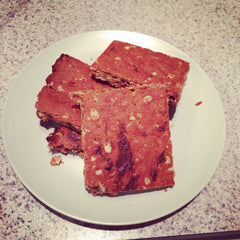 Our friends over at Clean Eating & Focused Training put together a great recipe for Chocolate Peanut Butter Organic Whey Protein Bars.
Our friends over at Clean Eating & Focused Training put together a great recipe for Chocolate Peanut Butter Organic Whey Protein Bars.
The recipe is below but be sure to check out their website for great recipes and training tips.
Chocolate Peanut Butter Protein Bars
2 c toasted oats
1 1/4 c peanut butter
1c (approx 4 scoops) of Source Organic whey protein
1/2 c honey
1/2 c applesauce
2 tbsp melted Kelapo coconut oil
2 tablespoons flax seeds
2 tablespoons TruVibe Organics chia seeds
3 tablespoons chopped dark chocolate
Preheat oven to 350. Toast oats for about 10 minutes on a cookie sheet. Allow oats to cool. Mix all ingredients in a large mixing bowl. Line a cookie sheet with nonstick parchment paper. Press the dough into the cookie sheet, or use a rolling pin until it is all fairly even. It should only take up a half of a cookie sheet! Bake at 350 for 10-15 minutes. Make sure you don’t over do them! They burn very easily!
Gluten-Free Chocolate Protein Bread
Double Chocolate Chip Organic Protein Muffins
Flourless Blueberry Protein Pancakes
Pumpkin Flax Protein Pancakes
What’s the difference between the Non-GMO Project and USDA Certified Organic?
June 17 2014

In a nutshell, the Non-GMO Project goes the extra mile to ensure that all Non-GMO Project Verified foods have never been exposed to genetically modified organisms (GMOs). The description below runs through the possibility of cross contamination in crops and feed, and how the National Organic Program has great guidelines, but only the Non-GMO Project is testing to confirm there are no GMOs present.
Source Organic Whey Protein is proud to be the only Non-GMO Project Verified organic whey protein, and we have the great people at Rumiano Cheese Company and their local dairy farms to thank.
While the National Organic Program (NOP) identifies genetic modification as an excluded method, GMOs are not listed as a prohibited substance. This means that although GMO seeds are not supposed to be planted and GMO ingredients are not supposed to be used, no testing is required to show whether any GMO cross-pollination or contamination has occurred. These rules were established at a time when GMOs were in limited production and neither cross-pollination nor contamination was a significant risk. Unfortunately, that is no longer the case. Genetically modified varieties now make up the majority of key commodity crops in North America such as corn, soy, and canola. As such, cross-pollination from GMO crops and GMO contamination of non-GMO seeds, ingredients, and products is a real risk, even for certified organic products. The good news is that the NOP has excellent guidelines for traceability and segregation, and the Non-GMO Project is designed to honor the work that certified organic companies are already doing, with the added measure of testing risk ingredients at critical control points.
Super Smoothie - Strawberry, Vanilla, Coconut, Peanut Butter, and Organic Whey Protein Smoothie Recipe
June 08 2014
 Looking for a treat to help cool off in these warm summer months after a hard workout or just a hard day? Here is another great recipe from Organic Olivia.
Looking for a treat to help cool off in these warm summer months after a hard workout or just a hard day? Here is another great recipe from Organic Olivia.Vanilla, peanut butter, strawberry, and coconut come together in one delicious protein smoothie! This recipe is very versatile too since it is adaptable to any diet as the nut butter, sweetener, and milk can be replaced with the ingredients of your choice.
- 8 strawberries
- 3 inches of a vanilla bean, scraped or 1 tsp. vanilla extract
- 1 heaping tbsp. peanut or almond butter
- 1 scoop Source Organic Whey protein powder
- 2 tsp. coconut sugar or honey, agave, maple syrup, etc.
- 1 heaping tbsp. coconut oil
- fill the rest of the blender cup with almond milk or milk of your choice
Chocolate Protein "Milkshake" without the Milk
Berry Vanilla Protein Smoothie
Spiced Raspberry-Pear Organic Protein Smoothie
Banana Peanut Butter Smoothie
Source Organic Whey Chocolate Protein "Milkshake" without the Milk
May 27 2014
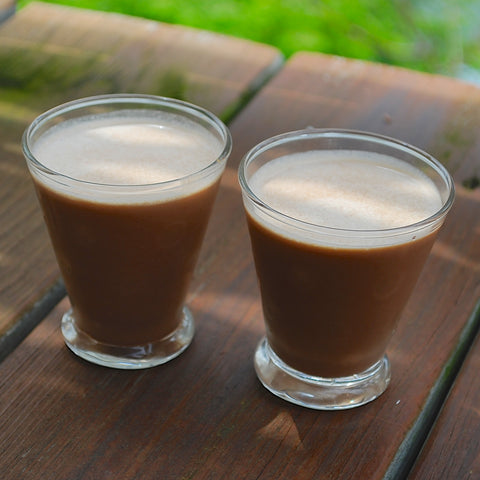
Ingredients:
- 8 oz. almond milk
- 1/2 frozen banana
- 1 scoop Source Organic Whey Protein
- 2 tbsp. raw cacao powder
- 1 tbsp. raw almond butter
- 1/2 tsp. vanilla extract
- pinch of sea salt
- pinch of cinnamon
- 2 tbsp. agave nectar
Take a look at some of our other recipes here:
Berry Vanilla Protein Smoothie
Spiced Raspberry-Pear Organic Protein Smoothie
Banana Peanut Butter Smoothie
Source Organic Pr(oat)ein Cookies
Here's another great recipe from Organic Olivia!May 06 2014

- ½ cup coconut oil, melted
- ¼ cup coconut sugar
- 25 to 30 drops stevia, if you don’t use stevia just use another ¼ cup of coconut sugar
- 1 egg
- 1 tbsp vanilla extract
- ½ cup Source Organic Protein Powder
- 3/4 cup almond flour
- 1 and ¼ cup gluten free oats
- ½ teaspoon baking soda
- ½ teaspoon salt
- 2 tsp cinnamon
- ½ cup chopped pecans
- ½ cup cacao nibs
Directions:
1. Preheat the oven to 350 F.
2. Mix together the coconut oil, coconut sugar, and stevia.
3. Add in the egg and vanilla extract, stir, then add the rest of the ingredients. Mix very well.
4. Chill the dough in the fridge for 10 minutes, then bake on parchment paper for 15-20 minutes (until golden brown!)
Gluten-Free Chocolate Protein Bread
Double Chocolate Chip Organic Protein Muffins
Flourless Blueberry Protein Pancakes
Pumpkin Flax Protein Pancakes
Source Organic Pr(oat)ein Cookies
Here's another great recipe from Organic Olivia!Source Organic Whey Chocolate Brownie Bites
Here's another innovative recipe from Organic Olivia that uses unlikely materials to create a delicious treat.
Source Organic Whey Chocolate Brownie Bites
Here's another innovative recipe from Organic Olivia that uses unlikely materials to create a delicious treat.April 21 2014
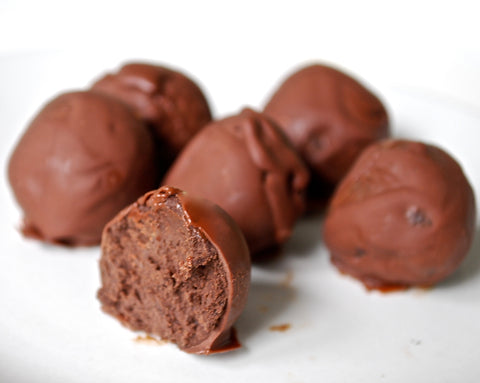 Here's another innovative recipe from Organic Olivia that uses unlikely materials to create a delicious treat. At Source Organic we stress that only the best ingredients are used and that's why we are proud to offer the highest quality, organic whey protein on the market. No other whey protein company comes exclusively from California farms where our farmers' cows are able to spend over 80% of the year out in the fields rather than stuck in barn. When looking for a pure organic whey protein, look no further than Source Organic Whey.
Here's another innovative recipe from Organic Olivia that uses unlikely materials to create a delicious treat. At Source Organic we stress that only the best ingredients are used and that's why we are proud to offer the highest quality, organic whey protein on the market. No other whey protein company comes exclusively from California farms where our farmers' cows are able to spend over 80% of the year out in the fields rather than stuck in barn. When looking for a pure organic whey protein, look no further than Source Organic Whey.Bites:
1- 15 oz can low-sodium or no salt added organic black beans, rinsed and drained, patted dry
Here are some other great recipes to try out:

